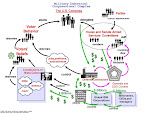A government does many things, often unrelated or even contradictory. However. It't top-level strategy is so visible and slow moving that it's impossible to miss.
Since 2001, the top-level strategy of the US government has been war in the persian gulf and afghanistan, based on the premises that the top-level problems facing the country are oil and defending against terrorists, and that large-scale military operations in Iraq and Afghanstan are just the right thing to ensure more oil, and ensure less terrorism.
By now, everybody can see that the wars are yielding neither oil nor security. It is fairly clear that we have been deceived, and manipulated, by the true beneficiaries of the wars (global oil and financial interests, the weapons industry, and senior US military and civilians, among others.)
The top level strategy of the national government under Obama or McCain will be the same.
Accordingly, thinking people need to formulate top-level strategy of our own-- one that is capable of realizing our values and goals.
Those include global justice instead of wars, exploitation and greed, and stopping the needless destruction of our global air, water, and lands.
To achieve these, will require top-level strategy so large and visible, that it will be impossible to miss. A form of action that recognizes governments and corporations for what they are, and abandons all fantasy that they will save us.
A form of action that goes beyond the entire institutions of the state, and beyond the money economy and private contract. And I would submit, one which goes beyond individual NGOs or nonprofits.
Now--- what do you think our top-level strategy is? Surely, it is already underway, since it must be very large and visible and glacial, by the very nature of this problem. Don't you think the pattern is becoming clear, as to the BIGGEST problem(s) that the US population actually faces, and the MOST obvious and clear strategy to deal with them?
HINT: we know from the unvarying experience of the past 200 years, that neither presidents, governors, or federal or state legislatures are going to solve the underlying problem we have.
We're also in a pickle because there are no institutions such as unions, or academia, or the press, that are going to save us, either.
So, I think the present disastrous policies of the US, and behavior of global corporatoins will continue for some time, even as the painful consequences become worse and worse. So where does it all end?
I think there are many thinking people, people who are actually quite influential and active in their own circles of influence.
And in the aggregate, these non-participants are more powerful than special interests... of course. It goes without saying.
Needless to say, we find the duopoly parties and most other institutions, a dead end. People with normally developed thinking abilities and compassion tend to be under-represented in executive or powerholding roles in corporations or government. So, the direct assertion of power is fairly limited, and it is insufficient. It is systematically, decisively, critically insufficient.
Now-- these invisible people seem to have concluded, or resolved for themselves, to work in isolation. They think, they read, they brood, and you don't see their faces publicly except in times of very unusual crisis. That is one thing we can observe.
I seem to observe the top-level strategy of these people--the great bulk of them-- is to directly influence public opinion, and to prevent the corporate state from controlling, without criticism, the propaganda message that today, rolls out from the media, the pulpit and the school system, and the duopoly parties.
To restate this-- we have a corporate state controlling the propaganda message in three main institutions of mass culture (schools, pulpit and media). And in the other corner, we have the people criticizing this message in millions of personal and internet interactions, every day.
It is worth considering, whether this can succeed. I don't think it is sufficient.
Our top-level strategy has been to argue back hard, persistently, in so many detailed areas where policy has been corrupted by the greed and violence people, --- and to provide instead our own solutions and policies that are consistent with our own values.
We have been waging a battle of ideas. A battle for hearts and minds. And it goes far beyond the issue of war, itself. When we neglect a hundred smaller things, from economics to environment, neglecting the cause of justice, the larger policy choice of war became inevitable.
Todd
Subscribe to:
Post Comments (Atom)

No comments:
Post a Comment